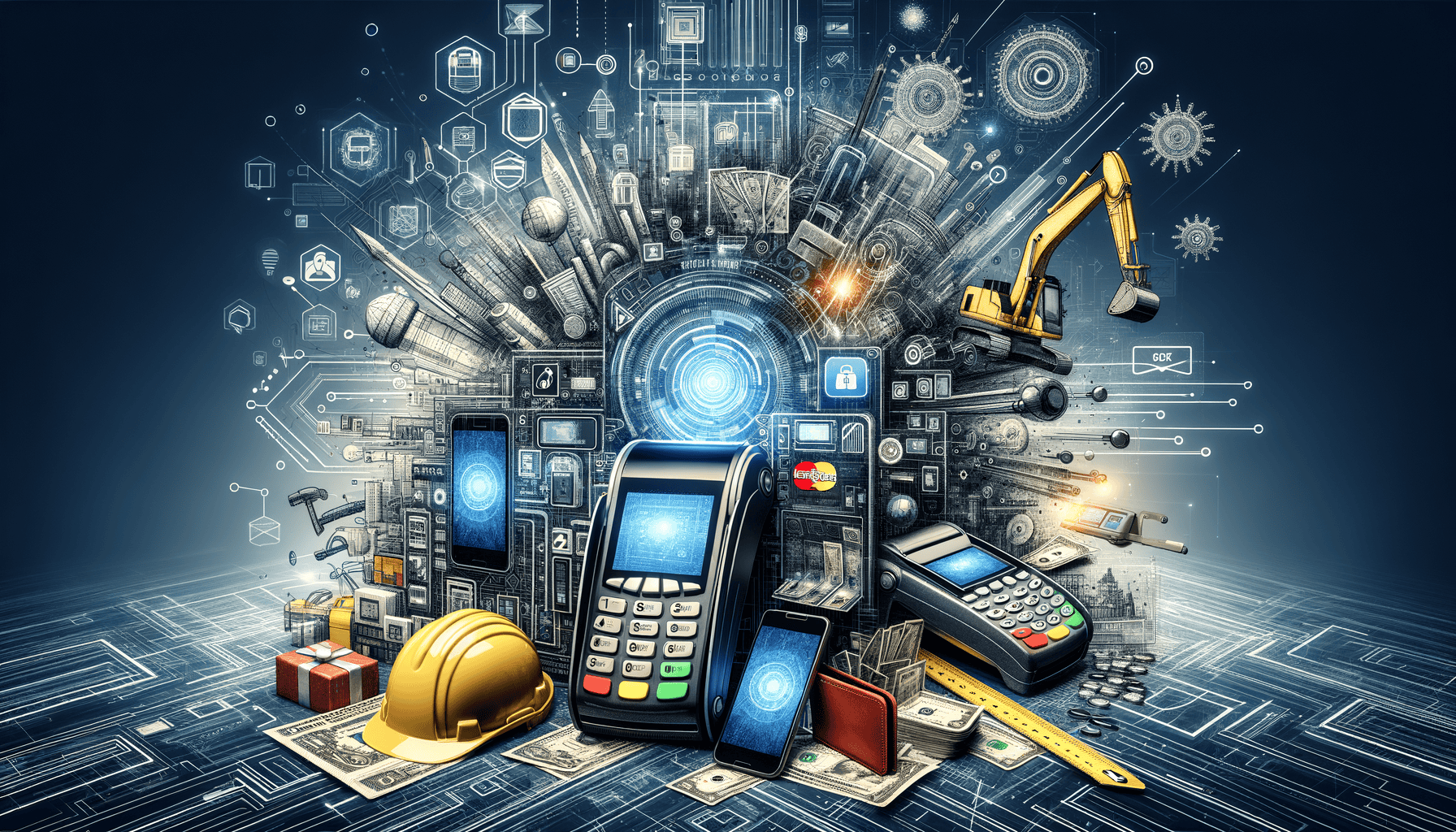
By alphacardprocess April 5, 2025
In the ever-evolving world of construction, payment processing plays a crucial role in ensuring smooth financial transactions between contractors, subcontractors, suppliers, and other stakeholders. As technology continues to advance, the construction industry is witnessing a significant shift towards digitalization and the adoption of emerging technologies.
These trends are revolutionizing the way payments are made and received in the construction sector, leading to increased efficiency, transparency, and security.
The Impact of Digitalization on Construction Payment Processing

Digitalization has had a profound impact on various industries, and the construction sector is no exception. Traditionally, construction payment processing involved manual paperwork, delays, and potential errors. However, with the advent of digital platforms and software solutions, the industry is experiencing a transformation in payment processing.
One of the key benefits of digitalization in construction payment processing is the elimination of paper-based invoices and checks. Digital platforms enable contractors and subcontractors to submit invoices electronically, reducing the time and effort required for processing. This not only speeds up the payment cycle but also reduces the risk of lost or misplaced documents.
Furthermore, digitalization allows for real-time tracking and monitoring of payment statuses. Contractors can easily access payment information, track progress, and receive notifications when payments are made. This level of transparency enhances trust and collaboration among project stakeholders, leading to smoother payment processes.
Emerging Technologies in Construction Payment Processing

The construction industry is witnessing the emergence of various technologies that are revolutionizing payment processing. One such technology is cloud computing, which enables secure storage and access to payment data from anywhere, at any time. Cloud-based payment processing platforms provide a centralized hub for contractors, subcontractors, and suppliers to manage and track payments efficiently.
Another emerging technology in construction payment processing is the Internet of Things (IoT). IoT devices, such as sensors and wearables, can be used to automate payment processes by capturing and transmitting real-time data. For example, IoT-enabled devices can track equipment usage on a construction site and automatically generate invoices based on usage data, streamlining the payment process.
Blockchain and its Role in Secure Construction Payments

Blockchain technology has gained significant attention in recent years due to its potential to revolutionize various industries, including construction payment processing. Blockchain is a decentralized and transparent ledger that records and verifies transactions securely. In the construction industry, blockchain can enhance the security and efficiency of payment processes.
One of the key advantages of blockchain in construction payment processing is the elimination of intermediaries. By using smart contracts, which are self-executing contracts with the terms of the agreement directly written into code, payments can be automatically triggered when predefined conditions are met. This reduces the need for manual intervention and minimizes the risk of fraud or disputes.
Additionally, blockchain provides a tamper-proof record of payment transactions, ensuring transparency and accountability. Contractors and subcontractors can have a clear audit trail of payments, reducing the potential for payment disputes and improving trust among project stakeholders.
Mobile Payment Solutions for Construction Industry
Mobile payment solutions have gained popularity in various industries, and the construction sector is no exception. With the widespread use of smartphones and tablets, contractors and subcontractors can now make and receive payments on the go, eliminating the need for physical checks or cash.
Mobile payment solutions offer convenience and speed in construction payment processing. Contractors can easily generate invoices, send payment requests, and receive payments through mobile apps. This not only saves time but also reduces the risk of lost or delayed payments.
Integration of Artificial Intelligence in Construction Payment Processing
Artificial Intelligence (AI) is revolutionizing various aspects of the construction industry, including payment processing. AI-powered systems can automate repetitive tasks, analyze payment data, and provide valuable insights to improve payment processes.
One application of AI in construction payment processing is the use of machine learning algorithms to analyze historical payment data and predict payment patterns. This can help contractors and subcontractors forecast cash flow, identify potential payment delays, and take proactive measures to ensure timely payments.
Furthermore, AI-powered chatbots can provide instant support and assistance to contractors and subcontractors regarding payment-related queries. These chatbots can understand natural language and provide accurate and timely responses, improving customer service and reducing the need for manual intervention.
Streamlining Construction Payment Processes with Automation
Automation is a key trend in construction payment processing, enabling contractors and subcontractors to streamline their payment processes and reduce manual errors. Automation can be applied to various aspects of payment processing, including invoice generation, payment approvals, and reconciliation.
By automating invoice generation, contractors can save time and effort in creating and sending invoices to clients. Automated systems can generate invoices based on predefined templates, populate them with relevant project and payment information, and send them to clients electronically.
Payment approvals can also be automated using workflow management systems. These systems allow contractors to define approval hierarchies and automate the routing of payment requests to the appropriate stakeholders. This eliminates the need for manual follow-ups and ensures timely payment approvals.
Enhancing Transparency and Accountability in Construction Payments
Transparency and accountability are crucial in construction payment processing to ensure fair and timely payments to all project stakeholders. Emerging technologies, such as digital platforms and blockchain, are enhancing transparency and accountability in construction payments.
Digital platforms provide a centralized hub for contractors, subcontractors, and suppliers to access payment information and track payment statuses in real-time. This level of transparency reduces the potential for payment disputes and fosters trust among project stakeholders.
Blockchain technology, with its decentralized and transparent nature, provides an immutable record of payment transactions. Contractors and subcontractors can have a clear audit trail of payments, reducing the risk of fraud or disputes. This level of accountability ensures fair and transparent payment processes in the construction industry.
Overcoming Challenges in Construction Payment Processing
While future trends in construction payment processing offer numerous benefits, there are also challenges that need to be addressed. One of the key challenges is the resistance to change and the adoption of new technologies. Many contractors and subcontractors may be hesitant to embrace digital platforms or invest in emerging technologies due to concerns about cost, complexity, or security.
To overcome this challenge, industry stakeholders need to be educated about the benefits of digitalization and emerging technologies in construction payment processing. Training programs, workshops, and industry conferences can help raise awareness and provide practical guidance on implementing these technologies.
Another challenge in construction payment processing is the fragmentation of payment systems and processes. Different stakeholders may use different payment platforms or have varying payment terms, leading to complexity and inefficiency. Standardization and collaboration among project stakeholders can help overcome this challenge and streamline payment processes.
FAQs
Q1. What are the benefits of digitalization in construction payment processing?
A1. Digitalization in construction payment processing offers benefits such as reduced paperwork, faster payment cycles, real-time tracking of payment statuses, and enhanced collaboration among project stakeholders.
Q2. How does blockchain enhance security in construction payments?
A2. Blockchain provides a decentralized and transparent ledger that records and verifies payment transactions securely. It eliminates the need for intermediaries, reduces the risk of fraud or disputes, and provides a tamper-proof record of payment transactions.
Q3. How can mobile payment solutions benefit the construction industry?
A3. Mobile payment solutions offer convenience and speed in construction payment processing. Contractors and subcontractors can make and receive payments on the go, eliminating the need for physical checks or cash.
Q4. How does AI improve construction payment processing?
A4. AI-powered systems can automate repetitive tasks, analyze payment data, and provide valuable insights to improve payment processes. AI can help forecast cash flow, identify potential payment delays, and provide instant support and assistance to contractors and subcontractors.
Q5. What are the challenges in construction payment processing?
A5. Challenges in construction payment processing include resistance to change, fragmentation of payment systems and processes, and concerns about cost, complexity, or security.
Conclusion
Future trends in construction payment processing are transforming the way payments are made and received in the construction industry. Digitalization, emerging technologies, and automation are enhancing efficiency, transparency, and security in payment processes. The adoption of digital platforms, mobile payment solutions, and AI-powered systems is streamlining payment processes, reducing manual errors, and improving collaboration among project stakeholders.
Blockchain technology is revolutionizing construction payment processing by providing secure and transparent payment transactions. It eliminates intermediaries, enhances accountability, and reduces the risk of fraud or disputes. Mobile payment solutions offer convenience and speed, allowing contractors and subcontractors to make and receive payments on the go.
AI-powered systems automate repetitive tasks, analyze payment data, and provide valuable insights to improve payment processes. Automation streamlines invoice generation, payment approvals, and reconciliation, reducing manual errors and saving time. Transparency and accountability are enhanced through digital platforms and blockchain, fostering trust among project stakeholders.
While challenges exist, such as resistance to change and fragmentation of payment systems, education and collaboration among industry stakeholders can help overcome these challenges. The future of construction payment processing is promising, with technology playing a pivotal role in improving efficiency, transparency, and security in financial transactions within the construction industry.